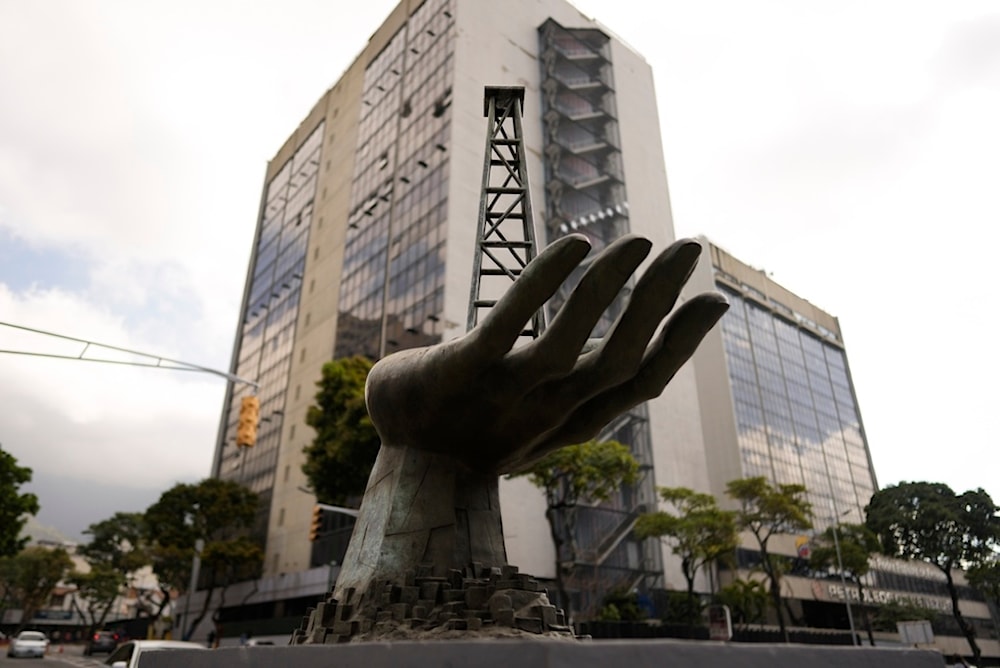Venezuela halts Chevron's crude loadings amid escalating US sanctions
Venezuela’s state oil company PDVSA revokes several authorizations for Chevron to load and export crude, following renewed US sanctions and tariff measures targeting the country's oil sector.
-
 A sculpture of a hand holding an oil drilling rig stands outside the state-run oil company Petroleos de Venezuela S.A. or PDVSA, in Caracas, Venezuela, on March 21, 2023 (AP)
A sculpture of a hand holding an oil drilling rig stands outside the state-run oil company Petroleos de Venezuela S.A. or PDVSA, in Caracas, Venezuela, on March 21, 2023 (AP)
Venezuela’s state oil company, PDVSA, has revoked several authorizations previously granted to US-based Chevron to load and export Venezuelan crude in April, Reuters reported on Friday, citing three sources familiar with the matter.
The move follows US President Donald Trump’s recent imposition of tariffs on purchasers of Venezuelan oil. It also comes after Washington last month rescinded key licenses that had allowed a limited number of PDVSA partners and customers, including Chevron, to operate and export Venezuelan crude under exemptions to US sanctions on the country.
The US Treasury Department has given those companies until May 27 to wind down their operations and complete any remaining transactions. Under its now-canceled license, Chevron had been exporting approximately 250,000 barrels per day of Venezuelan crude to the United States.
Earlier this month, Washington imposed a 25% tariff on imports of Venezuelan oil and gas—a move analysts say could most severely affect China, Venezuela’s largest oil buyer.
According to one source, two of the canceled shipments involved tankers that had already been loaded and will now have to return to port, while a third shipment had yet to be loaded. It remains unclear whether these cargoes will be rescheduled.
The Venezuelan government, led by President Nicolas Maduro, once again denounced the US measures on Thursday, describing them as part of an ongoing “economic war”.
The new tariffs prompted a temporary halt in some oil loadings earlier this month, particularly those destined for China, though shipments have reportedly resumed this week.
Chevron, whose exports of Venezuelan crude had previously been shielded from the US tariffs due to its special license, had not faced any disruptions from the measures until now, according to sources and shipping data tracking tanker movements.
Venezuela national assembly passes economic emergency decree
The latest announcement comes after Venezuela’s National Assembly on Thursday approved a decree proposed by Maduro’s government declaring a state of economic emergency in response to US sanctions and tariffs.
Maduro signed the decree on Tuesday, invoking his constitutional authority to declare states of emergency.
The new measure grants the president broad powers to implement policies aimed at stimulating economic growth, controlling inflation, providing incentives for investors, suspending taxes or exemptions, and promoting import-substitution strategies, among other initiatives.
Vice President and Oil Minister Delcy Rodriguez, who presented the decree to lawmakers, said the emergency regulation is intended to support national production.
She acknowledged that the US measures are impacting the economy but noted that oil and gas production continues despite a 30% decline in prices.
Rodriguez emphasized that Venezuela remains open to international producers, provided they comply with national laws.
Analysts have warned that the US actions could disrupt Venezuela’s oil revenue stream, with potential consequences for the country’s foreign exchange market and domestic prices.
Maduro and his administration have consistently denounced US and other international sanctions as illegitimate and part of an “economic war” aimed at destabilizing Venezuela.
A similar decree was signed by Maduro in 2016 and extended through 2021 in response to US sanctions.
The newly approved decree will now be reviewed by a chamber of Venezuela’s Supreme Court.
Read more: US sanctions on Venezuela aim to cause civil war: Defense minister

 4 Min Read
4 Min Read










